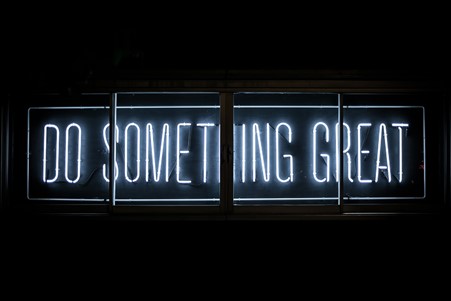It all starts with …You!
It’s time for all of us — to take a lesson from the big brands, a lesson that’s true for anyone who’s interested in what it takes to stand out and prosper in the new world of work. Regardless of age, regardless of position, regardless of the place/vocation we happen to be in, all of us need to understand the importance of branding. We are CEOs of our own companies: Me Inc. To be successful today and tomorrow, our most important job is to be head marketer for the brand called You. It’s that simple — and that hard. And that inescapable. The good news — and it is largely good news — is that everyone has a chance to stand out. Everyone has a chance to learn, improve, and build up their skills. Everyone has a chance to be a brand worthy of remark.
What makes You different?
Start right now: as of this moment you’re going to think of yourself differently! You’re not an “employee” of XYZ Ltd… you’re not a “staffer”, you’re not a “worker” or a “human resource” at ……You don’t “belong to” any company for life, and your chief affiliation isn’t to any particular “function.” You’re not defined by your job title and you’re not confined by your job description.
Starting today you are a brand.
You’re every bit as much a brand as Tata, Birla, Pepsi or Reliance. To start thinking like your own favorite brand manager, ask yourself the same question the brand managers at these companies ask themselves: What is it that my product or service does that makes it different? Give yourself the traditional 15-words-or-less contest challenge. Take the time to write down your answer. And then take the time to read it. Several times.
If your answer wouldn’t light up the eyes of a prospective client or command a vote of confidence from a satisfied past client, or — worst of all — if it doesn’t grab you, then you’ve got a big problem. It’s time to give some serious thought and even more serious effort to imagining and developing yourself as a brand.
Start by identifying the qualities or characteristics that make you distinctive from your competitors — or your colleagues. What have you done lately — this week — to make yourself stand out? What would your colleagues or your customers say is your greatest and clearest strength? Your most noteworthy (as in, worthy of note) personal trait?
Your next step is to cast aside all the usual descriptors that employees and workers depend on to locate themselves in the company structure. Forget your job title. Ask yourself: What do I do that adds remarkable, measurable, distinguished, distinctive value? Forget your job description. Ask yourself: What do I do that I am most proud of? Most of all, forget about the standard rungs of progression you’ve climbed in your career up to now. Burn that damnable “ladder” and ask yourself: What have I accomplished that I can unabashedly brag about? If you’re going to be a brand, you’ve got to become relentlessly focused on what you do that adds value, that you’re proud of, and most important, that you can shamelessly take credit for. When you’ve done that, sit down and ask yourself one more question to define your brand: What do I want to be famous for? That’s right — famous for!
What’s the pitch for You?
For most branding campaigns, the first step is visibility. If you’re brand You, you’ve got the same need for visibility — but no budget to buy it. So how do you market brand You?
There’s literally no limit to the ways you can go about enhancing your profile. Try moonlighting! Sign up for an extra project inside your organization, just to introduce yourself to new colleagues and showcase your skills — or work on new ones. Or, if you can carve out the time, take on a freelance project that gets you in touch with a totally novel group of people. If you can get them singing your praises, they’ll help spread the word about what a remarkable contributor you are.
If those ideas don’t appeal, try teaching a class at a community college, in an adult education program, or in your own company. You get credit for being an expert, you increase your standing as a professional, and you increase the likelihood that people will come back to you with more requests and more opportunities to stand out from the crowd.
The second important thing to remember about your personal visibility campaign is: it all matters. When you’re promoting brand You, everything you do — and everything you choose not to do — communicates the value and character of the brand. Everything from the way you handle phone conversations to the email messages you send to the way you conduct business in a meeting is part of the larger message you’re sending about your brand.
Partly it’s a matter of substance: what you have to say and how well you get it said. But it’s also a matter of style. On the Net, do your communications demonstrate a command of the technology? In meetings, do you keep your contributions short and to the point? It even gets down to the level of your brand You business card: Have you designed a cool-looking logo for your own card? Are you demonstrating an appreciation for design that shows you understand that packaging counts — a lot — in a crowded world?
The key to any personal branding campaign is “word-of-mouth marketing.” Your network of friends, colleagues, clients, and customers is the most important marketing vehicle you’ve got; what they say about you and your contributions is what the market will ultimately gauge as the value of your brand. So the big trick to building your brand is to find ways to nurture your network of colleagues — consciously.
The real power of You!
If you want to grow your brand, you’ve got to come to terms with power — your own. The key lesson: power is not a dirty word! Here we are talking about a different kind of power than we usually refer to. It’s influence power.
It’s being known for making the most significant contribution in your particular area. It’s reputational power. Getting and using power — intelligently, responsibly, and yes, powerfully — are essential skills for growing your brand. One of the things that attracts us to certain brands is the power they project. As a consumer, you want to associate with brands whose powerful presence creates a halo effect that rubs off on you. It’s the same in the workplace. There are power trips that are worth taking — and that you can take without appearing to be a self-absorbed, self-aggrandizing, megalomaniacal jerk. You can do it in small, slow, and subtle ways. Is your team having a hard time organizing productive meetings? Volunteer to write the agenda for the next meeting. You’re contributing to the team, and you get to decide what’s on and off the agenda. When it’s time to write a post-project report, does everyone on your team head for the door? Beg for the chance to write the report — because the hand that holds the pen (or taps the keyboard) gets to write or at least shape the organization’s history.
Most important, remember that power is largely a matter of perception. If you want people to see you as a powerful brand, act like a credible leader. When you’re thinking like brand You, you don’t need org-chart authority to be a leader. The fact is you are a leader. You’re leading You! One key to growing your power is to recognize the simple fact that we now live in a project world. Almost all work today is organized into bite-sized packets called projects. A project-based world is ideal for growing your brand: projects exist around deliverables, they create measurables, and they leave you with braggables. If you’re not spending at least 70% of your time working on projects, creating projects, or organizing your (apparently mundane) tasks into projects, you are sadly living in the past. Today you have to think, breathe, act, and work in projects. Whatever you decide, you should look at your brand’s power as an exercise in new-look résumé; management — an exercise that you start by doing away once and for all with the word “résumé.” You don’t have an old-fashioned résumé anymore! You’ve got a marketing brochure for brand You. Instead of a static list of titles held and positions occupied, your marketing brochure brings to life the skills you’ve mastered, the projects you’ve delivered, the results you can take credit for. And like any good marketing brochure, yours needs constant updating to reflect the growth — breadth and depth — of brand You.





0 Comments